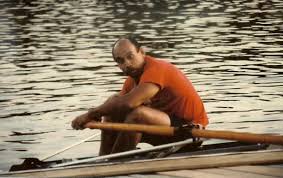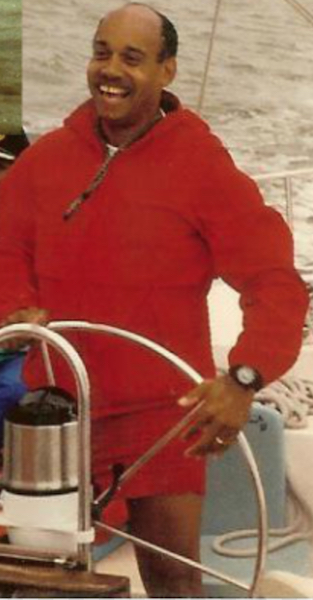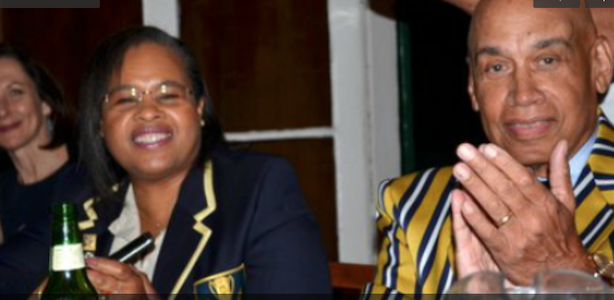
John Izzard, a first on the river
ohn Izzard joined the Undine Barge Club in 1974, one of a smattering of African Americans who were just finding their way into Boathouse Row. Yes, a summer program run by Chuck Colgan of the Vesper Boat Club was teaching low-income kids, including African Americans, to row, but it had little sticking power because their high schools did not have crew programs.
And yes, another African American –
Anita DeFrantz – was training at the Vesper Boat Club and would, in 1976, go on to win a bronze medal in the women’s eight at the Montreal Olympics, the first time women rowed in the world contest.
“In the early days, I did not see anybody who was African American which was odd because the boat doesn’t care. And anybody could join the clubs,” Anita told me.
In his 43d year at Undine, John has his own story to tell of what it was like to step into that white, male universe of the 1970s. He fell into rowing “just by accident,” he explained, because, like so many African Americans, he had no family history of rowing nor opportunity in his school or neighborhood to discover the sport.
The connection happened one day after he went to a hardware store on Germantown Avenue in search of welding rods for a high school class he was teaching. There, a guy named Charles Agnew asked John to check out some welding that had been done at his home.

John Izzard took on the challenge
“While we were just chitchatting, I noticed a particular type of boat on his mantle,” John said.
“He says, ‘You know about boating?’
“I say, “There’s nothing that I can’t sail or be proficient in.’
“He says, ‘I have the right thing for you. I’ll meet you down at Undine Barge Club. If you can take two strokes without turning over, I’ll take you and your wife or girlfriend to dinner.’ ”
John, a multi-talented athlete who had worked as a water safety and boating instructor, took the challenge, saying, “No problem. I’m a white water kayaker. I’m a sailor under gale force conditions.”
Sitting for the first time in a precarious shell, John recalled, ‘I took two strokes and turned over and I had to take him and his wife and my date to the old Bookbinders.”
Jim Barker, a champion rower and coach at the Undine Barge Club and the Haverford School, recommended John to the club’s membership committee. As I wrote in a
previous blog, Jim adamantly supported John Izzard, as did Undine’s president, standing up to grumblings by some members.
Compared with other venues in Philadelphia, John said, in some ways he found the Row “more welcoming.”
“Certain people didn’t speak to me. They didn’t even look at me. The majority did. Most folks were very supportive. No one hindered me. No one said anything open. It was either acceptance or not. No one blocked my membership entrance or blocked my becoming an active member. At that time you needed only two black balls. Everyone had to vote for you to enter and no one put a black ball in for me.”
He was grateful for the advice that Jim gave him.
“As Jimmy Barker would say, ‘You’re not here to make friends. You’re here to row. And by rowing, you make friends.’ I feel that was very true. It’s like any other sport. Most of the time people aren’t concerned about you. Either they will not relate to you or they will support you by accepting your presence.”
By training hard and rowing competitively, John made the social connections that have kept him and his wife, Parthenia, committed to Boathouse Row.
“I was invited to a lot of weddings, christenings, from members of the club,” said John. A decade ago, he was elected captain of Undine, the first African American to hold that position on Boathouse Row, he believes. In 2014, he became vice-president.
But John Izzard also remembers incidents in the early years where he was stereotyped.
“I’m rowing one day – this is in the ‘70s – and one of the kids in an eight from another club says, ‘He must be the maintenance man.’
“I didn’t say anything. I rowed past, back to the dock, and I mentioned it to their coach. Their coach made each and every one of them apologize and shake my hand.”
Another time, in an incident that today might be called “black while driving,” John was rowing his single down the river when a park police officer called him over. A boat had been reported stolen and the officer wanted to question him.
“I let him know who I was rowing for. I had the correct [Undine] t-shirt on, and he said, “I’ve seen you here before and I went on my merry way. It was a friendly encounter. Just time consuming. But it showed you that folks had recognized that I was, you know, different to some degree. I didn’t get angry.”
John would sometimes row with the only other black rower at Undine at the time: Dr. Gerald Groves, a psychiatrist who currently practices in Princeton. John thought that Dr. Groves preceded him as the first black rower at Undine but at a recent lunch Groves assured John that he was first,
A native of Jamaica and graduate of medical school there, Dr. Groves told me that he felt more comfortable in Philadelphia than he did in New Brunswick, Canada, where he did his internship, or at the University of Rochester where he did his psychiatry residency, both of which had few black professionals at the time.
Philadelphia, where he worked at the former Eastern Pennsylvania Psychiatric Institute, “was a reprieve because there was a significant black population,” he said. He became intrigued by rowing while jogging along the river and asked to join Undine.
“I didn’t feel a sense of racial animus,” he said.

John and Parthenia at a John Izzard Award, given each year to an astounding athlete
, who had started rowing in New York City, began racing after she joined Philadelphia Girls Rowing Club in 1986, shortly before marrying John. The issue for African American rowers, she said, is feeling comfortable socially. “If you don’t have a connection with someone, it’s hard,” she said. “It’s one thing to let someone into a club and another to integrate you into the culture of the club – to invite you to their home … or take you under wing,” she said. Sometimes, “it’s like you’re invisible.”
She and John have remained dedicated to rowing and club membership. Both are US Rowing officials and major donors to the Gold Cup.
An award in John Izzard’s name is given annually to a high school rower for athleticism, service and achievement. And Parthenia belongs to PGRC, the Vesper Boat Club and is on several Schuylkill Navy committees.
Rowing “is a very Zen experience, meditative and soothing,” the psychologist said. “Rowing backward – focusing on where you’ve come from rather than where you’re going – is peaceful.”
With more minorities in the Philadelphia area getting into rowing through high schools , Brannon Johnson’s
community rowing program, and the non-profit
Philadelphia City Rowing, which trains public school youth, the challenge for the Row is transitioning more of them into the clubs, Parthenia believes.
Her husband feels part of the responsibility lies with the African American community, for whom rowing is still largely an alien sport.
“If you don’t have exposure, you usually condemn or reject that which is new,” he said.
The Row, he says, “is more welcoming than most people, I believe, think.”





